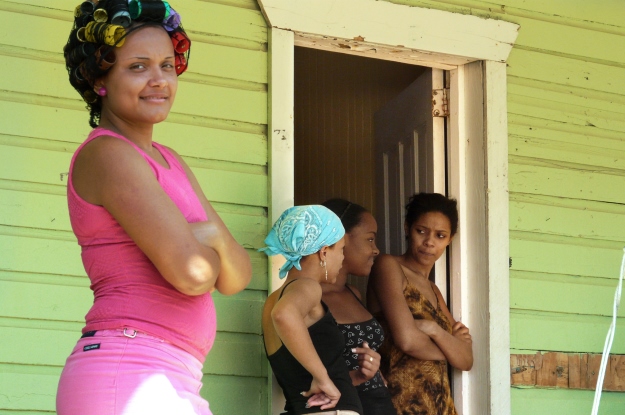When I lived in the Dominican Republic, there was a point when the jeers from the streets, shouts of “Arréglate ese pelo!” (Fix that hair!) and mocking gestures about my prominent pajón (afro) became too much to deal with. In a country of complex racial dynamics, where straightened hair is a social currency and billboards depict curly-haired women with the headline “Your hair deserves better,” natural or curly hair, colloquially referred to as pelo malo (bad hair—also a term used in the black American community), is sometimes viewed as a marker of Haitian identity. While many Dominicans vehemently deny the role of race in the current controversy over the deportation of Dominicans of Haitian descent and Haitian migrants, the treatment I received while living in the Dominican Republic (and often being mistaken as Haitian) suggests the contrary.
As a black American from the South, I initially (and perhaps naively) thought I’d catch a break from the daily racism I experienced in the U.S. As with black Americans, there are Dominicans (and Haitians) of every shade. I welcomed the idea of living in a country where most people looked like my family members and me, as 90 percent of the Dominican population has black ancestry.
However, it wasn’t long before I encountered a familiar, yet foreign, racism. While I realize that experiences vary and my story is one of many, it is certainly not the exception. Whether in the form of racial slurs or extreme violence, both Haitians and dark-skinned Dominicans alike confront racism on a daily basis. After continuously feeling like a walking target with my sizable pajón, I decided to carry hair ties for the days that the taunts became unbearable.
I arrived in Santiago, Dominican Republic as an English professor one month before Sentencia 168/13, a Supreme Court ruling that revoked the citizenship of Dominican residents whose parents were born outside of the country as far back as 1929, unless they could regularize their status. In the months that followed, lynchings of Haitians became more frequent, according to media reports. Black American friends that had come to study abroad were harassed and interrogated by police about their nationality. After my friends explained that they were Americans studying abroad, the officers scoffed at them, laughing that “esa se cree americana pero es haitiana” (this one thinks she’s American, but she’s Haitian). Even my Dominican host sister, whose surname was French in origin, encountered complications with government agencies that questioned her Dominican identity. I began to realize that the recurring treatment my colleagues and I were receiving was probably a result of intensified anti-haitianismo following the Supreme Court ruling.
Most of my fellow U.S. English professors condemned the ruling, though others viewed it as the Dominican Republic exercising its sovereign right to regulate immigration within its borders. Some of my Dominican and Haitian students criticized the ruling as discriminatory, while others adamantly defended the court’s decision. However, few dared to denounce it as racist.
I was no stranger to discrimination in the Dominican Republic, having endured taunts, repeatedly been denied entry to clubs, and received regular slights during my time there. With both the history of Hispaniola and my own experience in mind, I know the court’s ruling was founded upon anti-haitianismo that the country has yet to reconcile. In the words of Junot Díaz, “if we do not begin to practice the muscles of having a possessive investment in each other’s oppressions, then we are in some serious trouble.”








